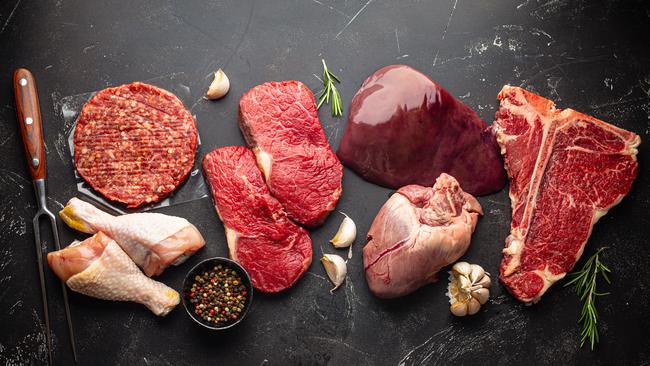Cost of living: Australia’s most popular diets compared for cost and health
As the cost of living skyrockets, we compare Australia’s most popular diets to find out which is best for your budget and health.
National
Don't miss out on the headlines from National. Followed categories will be added to My News.
We’ve rounded up the top five most popular Australian diets, and weighed them up for both their health benefits, and their affordability.
It’s easy to assume vegetable-based diets such as vegetarianism or veganism would be more cost effective than meat-heavy diets like keto and carnivore, but experts say it’s not as simple as that.
“With all the approaches, assessing what other foods need to be incorporated to get a nutritionally balanced diet is vital,” accredited practising dietitian and nutritionist Peter Clark said.

“Some diets will require supplementation, which can be costly, while others may lead to health issues that require prescription medications, hospitalisations and medical treatments that can be very expensive”.
VEGETARIAN
A vegetarian diet includes vegetables, salads, lentils, legumes, egg, cheese, milk, nuts, seeds and grains, and excludes all animal flesh, such as beef, chicken, fish, and pork.
“A vegetarian diet tends to be high in fibre, if a good variety of vegetables are consumed,” accredited practising dietitian Nicola Fox said.

Vegetarians tend to have lower saturated fat intake, better cholesterol/triglycerides levels, and a reduced risk of cardiovascular disease.
On the downside, Ms Fox said they often lack iron, zinc, vitamin B12 and protein, and must ensure they eat other non-animal sources of protein.
When it comes to cost, your average weekly shop for a seven-day vegetarian diet will set you back about $154.36.
VEGAN
Like vegetarians, vegans exclude animal flesh from their diet, but it take it one step further to remove all products derived from animals, including eggs and dairy products.
Also like vegetarians, the vegan diet can be high in fibre and antioxidants, but experts say there’s an even higher risk of inadequate protein, iron, zinc and B12 intake.

As for cost, you’re looking at around $164.02 for a week’s worth of food, but Mr Clark said both vegans and vegetarians needed to be prepared for hidden costs, both nutritionally and financially.
“For vegetarian and vegan diets, I recommend people get regular blood tests to assess their levels of all vitamins and minerals, and supplement if they are low,” he said.
“I would also recommend that you seek professional advice from a dietitian or a doctor to ensure you meet nutritional requirements.”
KETO
While there are various forms of the keto diet, the common feature is the restriction of carbohydrates, and a focus on foods that are predominantly fat or protein based.
“In a ketogenic diet, you avoid some core food groups – grains and cereals – and, in some cases, dairy products,” Mr Clark said.

That means root vegetables, fruit, legumes, lentils, grain, sugar and milk are all off the menu.
Ms Fox said a keto diet can lead to fat loss due to the liver converting fat into glucose for the body to use as fuel, but it does lack variety.
Mr Clark said this diet “can lead to high cholesterol levels and cardiovascular and renal disease risk”.
“As people have reduced the number of carbohydrates, they often complain about a lack of energy/power,” he said.
Cost-wise, you’ll need to add more meat to your shopping list, which can push up the price.
For a week’s worth of food, those on the Keto diet will pay around $161.68.
CARNIVORE DIET
As the name suggests, the carnivore diet consists of animal flesh and products only. It excludes all other foods, including fruits, vegetables, legumes, grains, nuts and seeds.
While Ms Fox said a meat-only diet could result in fat loss due to gluconeogenesis (liver converting fat into glucose), the extreme diet lacks antioxidants and fibre.

“Because there are no fruits, vegetables, legumes, grains, nuts, and seeds, it is virtually impossible to get enough fibre in the diet, which can cause constipation,” he said.
There’s also a higher risk of heart attacks, strokes, kidney disease, and osteoporosis.
Being primarily meat, shoppers can expect a higher grocery bill, with an average weekly shop costing around $176.36
As with vegetarian and vegan diets, Mr Clark recommends those on keto and carnivore diets get regular blood tests to assess cholesterol, triglycerides and kidney function, and frequent blood pressure monitoring.
MEDITERRANEAN
Inspired by the Mediterranean regions of the world, this diet includes lean protein, fish, salads, vegetables, nuts, seeds, fruit, legumes, and lentils, while avoiding processed and refined foods and sugar.
Mr Clark said it provided the widest variety of all vitamins and minerals and included foods from each of the core food groups.

A Mediterranean diet can promote weight loss and help prevent heart attacks, strokes, type 2 diabetes, and even premature death.
At around $154.23 per week for an average week’s worth of food, the Mediterranean diet offers other financial benefits too, which Ms Fox said includes buying foods that are in season.
By following this diet, you can swap out expensive items for lower cost items and still maintain your health goals.
“All the vitamins and minerals required are sourced from foods, and no supplementation is needed,” Mr Clark said.
Both Mr Clark and Ms Fox agree, the Mediterranean diet is the clear winner when it comes to health and affordability.

Regardless of your chosen diet though, there are ways you can cut grocery bill costs, without cutting corners on your health.
“Remember the cost of poor health will always outweigh the cost of good quality food,” Ms Fox said.
TIPS
1. Never go shopping hungry – you almost always buy more.
2. Always use a shopping list and stick to it.
3. Avoid impulse buys and products on sale. You may save some cash, but it could cost your health in the long run.
4. Stick to the middle of the aisles, there are usually no healthy food options at the ends.
5. Learn how to use a label to select products that have fewer nasties.
Originally published as Cost of living: Australia’s most popular diets compared for cost and health





